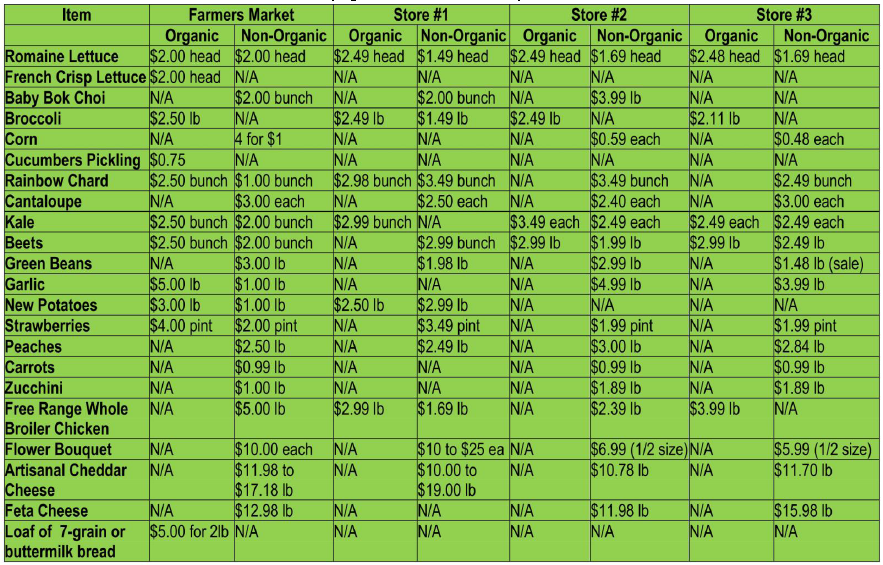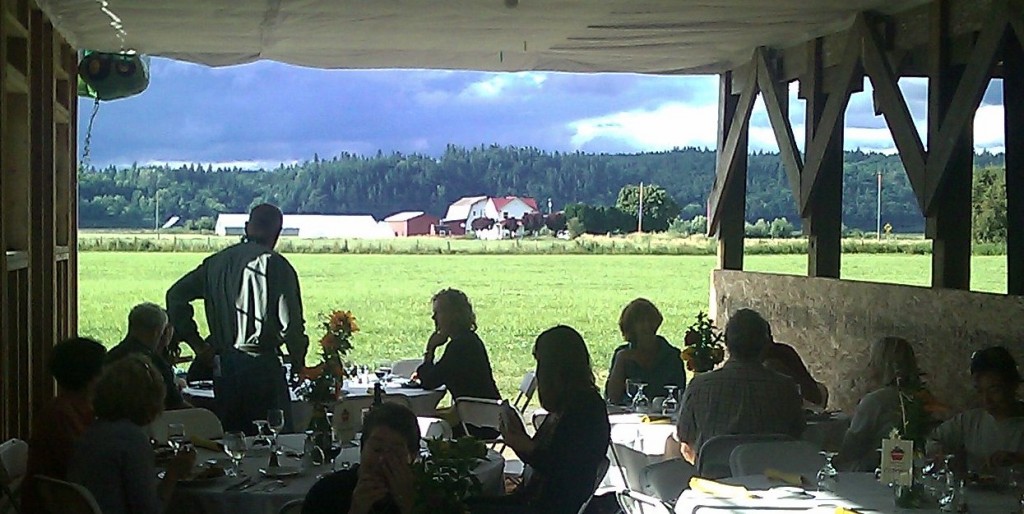As is always the case, as soon as I post a new entry to this blog, I realize I’ve missed something interesting. This article ran in the fall edition of the Snohomish County Conservation District newsletter. I found it a compelling case for urban agriculture. It is Urban Farming – Fad or Future?
Tag Archives: organic
But Isn’t It Expensive?
One of the assumptions made about farmers markets is that the prices are higher than normal. I usually find that what I purchase is fairly comparable to what I would buy in the store, but that’s merely anecdotal. Let’s take a look at how our market’s prices compare to the current prices at the stores in town:
At our Port Susan Farmers Market, meat is more, cheese is comparable to the gourmet and organic varieties, produce is somewhat less expensive and flowers are considerably less expensive considering the size of the bouquet. If prices are similar to our local stores, why do we need Farmers Markets? Why should we patronize them? What good do they do for the community? Why are they important?
(Wow. That was a lot of questions.)
Most of us know that price isn’t everything. You want something good for the money you spend. Our local stores provide a valuable service. The give us food and many of the other items we need every day, any time we need them. (Where else are you going to get an emergency bottle of nail polish at midnight?) They also provide us with items we can’t grow here, such as oranges and bananas.
However, there’s a great deal of value in locally grown, hand raised food, produced by our neighbors. Farmers markets provide several intangibles that you just can’t get anywhere else.
First, the closer you move food from harvest to table, the healthier it is. Much of the produce at the farmers market is harvested that morning. You’re getting the maximum amount of vitamins and minerals because the produce is not a week or two old. Charlene Byde from Freshly Doug Vegetables says, “Doug and I both feel that a Farmer’s Market provides the freshness factor. The fresher the produce, the better it tastes; the better it tastes, the more likely it will be eaten. There is nothing tastier than a cucumber or tomato that’s been ripened on the vine and brought to market that same day! A real taste treat!”
Second, the better you raise food, the more nutritious it is. This has been proven in a number of studies. I recently discovered an article from the Atlantic magazine that referenced three 2012 studies. It concluded that the way we conventionally raise chicken in the United States contributes to a sizable increase in internal infections in people. It also said that these infections have become more antibiotic resistant in the last three years. Free range chickens raised without routine dosing of antibiotics don’t cause these problems. For my money, I want a healthier option.
Jim Hall, of Balanced System Farm comments, “An industrial chicken costs less to raise than a healthy chicken raised on an independent, small farm. The industrial chicken is bred to gorge so it is ready for market in eight weeks, eats subsidized feed, grows up with thousands of other chickens, is routinely given antibiotics to prevent diseases caused by overcrowding and probably never sees daylight. Healthy chickens eat quality feed, are given no antibiotics, are raised exclusively outdoors on luscious green grass that has seen no chemicals, and take 11-12 weeks to mature. We just had one for dinner and the taste and texture are incomparable.”
Third, farmers markets contribute to the genetic diversity of our foods. Local farmers can grow a greater variety of produce because it doesn’t have to be transported long distances. Large, commercial growers usually cultivate no more than two varieties of any single crop. Local farmers usually grow many, some heirloom or rare. The first time I had butter lettuce was from a farmers market and it was amazing. It’s the only place where you can find fingerling potatoes, Cherokee Purple tomatoes, lemon cucumbers, and a whole host of intriguing new tastes.
Fourth, patronizing your farmers market bolsters the local economy, supports farmers and keeps land that would otherwise go fallow under cultivation.
Fifth, you get to meet the farmers at the market. I love that part. I learn so much about the foods they produce and about how they will taste in the recipes I prepare.
Sixth, my friends are at the market and this gives me a chance to reconnect with them. The market creates a greater sense of community and makes the town more attractive to those passing by. It can also be the basis for creating small businesses and increasing the visibility of local businesses already established in town. If folks are coming to town for the market, they can get their other errands done, too. Why go anywhere else?
By far, though, the best reason to go to the farmers market is the food. It’s just so incredibly good at any price. I’m eating a peach from last Friday’s market and it’s the best one I think I’ve ever had. I don’t even care that there’s juice running down my chin, it’s so good.
(P.S. If you want to know when I post to my blog, you can follow me at @ruraltechgeek on Twitter or click on the “Entries RSS” link under the “Meta” heading on the right side of the page to get a notification in your email. Thanks for reading!)
Farm to Fork
For the first time ever, I attended a Farm to Fork dinner. (I know, I know, why did it take me so long…) It was at Whispering Winds Farm, home of Freshly Doug Vegetables, a local CSA and farmstand farm. It was held inside their heritage barn which has quite a nice view of the valley. We were serenaded by the band Cabin Fever and Pacek Winery kept the mood jovial with some delightful white, red, and dessert wines.
Considering that this was their first ever dinner, our hosts, Char and Doug, were quite well organized. There were a few hitches, such as some of the vegetables not being harvestable in time due to the cool weather, but they persevered. Menus were slightly changed. Last second details were modified. Everything came together in the end.
We had a nice time hanging out on the farm, talking to the goats, walking the fields, sipping wine, and chatting up the other guests. I was able to talk to the chef, Devra Gartenstein, who created the recipes we enjoyed. She has several cookbooks published and some were given away in a gift raffle. (No, I didn’t win one, but The Neighbor, who went with me, did win a Freshly Doug Vegetables hat. I’m almost jealous.) Devra’s blog is quirkygourmet.com, where she writes extensively about good food.
If you find a Farm to Fork event in your area, go! It’s a great way to spend an evening.
Sustainability Fair
This last weekend I attended the Mother Earth News Fair which included all things having to do with sustainability. I found interesting vendors, new ideas, and amazing books. I met Dan Adams who, after discovering that there was no sustainability community online, created one. It is www.earthineer.com and even though it is still in beta, it’s a very active community. I joined.
Seattle Tilth was there sharing information on all the programs they do in King County. They have a Refugee Farming program, through their United People’s Farm Incubator, that I found intriguing. They combine empty urban land with those who have come to Seattle as refugees from other countries. Many have nothing when they get here and farming was all they knew in their former lives. Several farms are now successfully selling at farmer’s markets throughout King County.
So Delicious, one of my favorite companies, was giving away samples of ice cream made with coconut milk. For someone allergic to both milk and soy, this is a great way to beat the heat. I use their coffee creamers constantly.
Other highlights included a lovely yellow Tesla electric sports car, many models of tiny houses, a draft horse logging exhibition, lots of guest speakers including Ed Begley, Jr., thousands of books on sustainability, and good organic food vendors.
If you get the chance to go to this fair, do it! It’s happening in San Rafael, CA and in Pennsylvania, both in September.
To veg or not to veg; that might not be the question…
I might as well get this out of the way. It’s that age old argument against eating meat. Eating a vegetarian or vegan diet is easier on the planet and, in many cases, better for our health. However, there are those of us who can’t. Yes, really. We can’t. Let me explain.
I am constantly searching for a better way to feed myself, especially since I have Fibromyalgia. Better nutrition means less pain. (That’s also one reason I choose to grow my own food, but that’s for a whole new posting.) I tried being vegetarian for a year. In that time I was routinely getting sick and couldn’t quite shake the unrelenting fatigue. I finally went to my rheumatologist who tested me for food allergies. Apparently, I have quite a few. The big ones were pretty serious, as it turns out:
- Vegetable proteins, including nuts, seeds, soy, all high protein veggies
- Nightshade plants – potatoes, tomatoes, peppers (yes, all of them) and eggplants
- Grains – almost every one
- Tropical fruits
- Dairy products
All of these were making me very ill. The weird fact was that the only proteins I wasn’t allergic to were meat, poultry, and fish. I have no choice. If I don’t want to be sick constantly, or die from lack of protein, I have to eat meat. What’s an animal lover to do?
I talked with my Tibetan friends, whose Buddhist beliefs teach them to revere all life as precious. They also have traditionally lived at or above 10,000 feet where not much grows. For thousands of years, they have lived off of meat and dairy as those were the only things available. To balance their resources with their beliefs, they have put practices into place, mitigating loss of life. One large animal feeds many people as opposed to smaller animals which can’t feed as many. This is why rivers in Tibet don’t get harvested for their shrimp or fish. It would take many lives to feed one person.
When they came to the U.S., many of them tried to become vegetarian. They became ill because their bodies weren’t used to that diet. They had to go back to meat and dairy. Even His Holiness, the Dalai Lama tried to be vegetarian once and had the same experience.
My Blackfoot friend, Bob, comes from a tradition of great reverence for the animals, bison mostly, who give of themselves so that people can live. His knowledge of the Northern Plains and his deep understanding of the natural world gives me a glimpse of what it means to regard animals not as other, but as us. It means that we must be thankful for every life-sustaining thing we receive from the world, not just once in awhile, but constantly.
I have conversations with my friend, Nancy, who is vegan and understands why I eat meat. We’ve really come to the conclusion that people must choose what’s best for them. I eat nutritiously and do what’s right for the environment, insofar as it’s possible. I make sure the meat I eat comes from producers I know. I know how they raise their animals. I don’t waste anything. I do my best.
Okay, that’s done. On to more farming talk…



